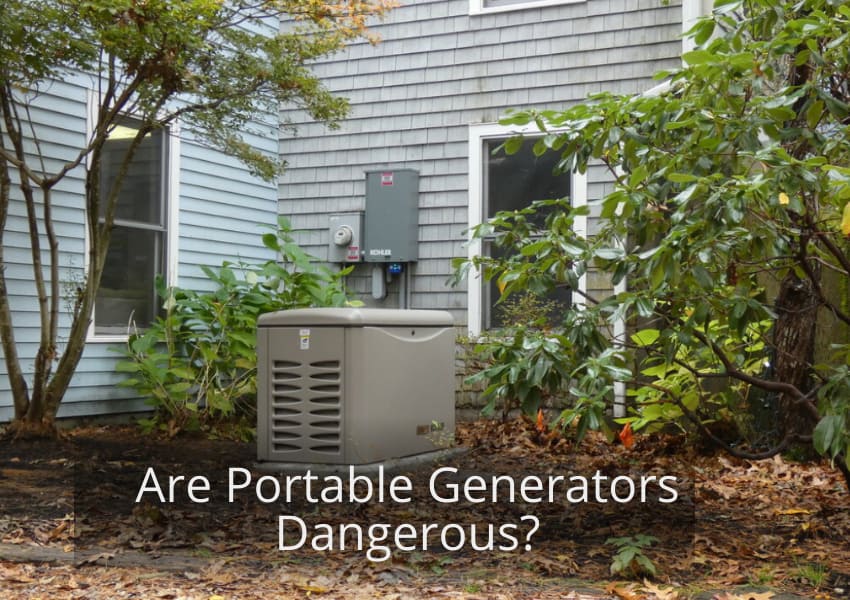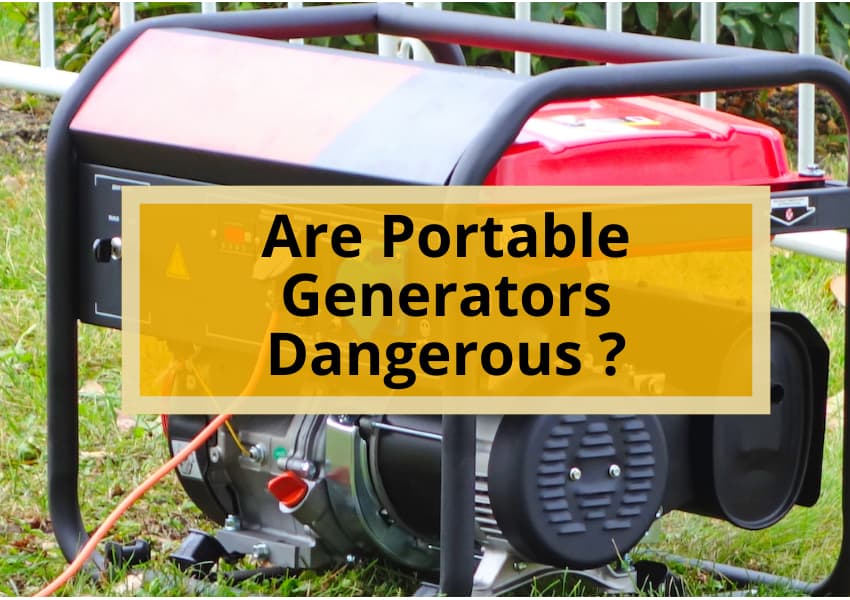Portable generators can be a valuable source of power during emergencies or when you’re off the grid, but it’s important to understand and mitigate the potential risks associated with their use.
In this article, we’ll explore what makes portable generators dangerous and discuss essential safety measures to ensure the well-being of you and your loved ones.

Importance Of Portable Generator
Portable generators can be incredibly useful in various situations, providing power during emergencies, outdoor activities, or in areas where electricity is not readily available. They offer a sense of security and convenience, allowing you to maintain essential electrical functions when needed.
Whether it’s powering your home during a power outage or providing electricity for outdoor events, portable generators can be a valuable asset. However, it’s crucial to understand the potential dangers associated with their use and to prioritize safety.
What Makes Portable Generators Dangerous?
Portable generators can pose serious risks, including carbon monoxide poisoning, electric shock, and accidental fires.
Carbon Monoxide Poisoning
Carbon monoxide is a colorless, odorless gas produced by burning fuel, such as gasoline in generators. Inhaling high levels of carbon monoxide can lead to severe health issues, including brain damage and even death.
To avoid the dangers of carbon monoxide poisoning and protect yourself, it is crucial to follow proper generator usage guidelines.
How To Avoid CO Poisoning and Protect Ourselves?
To avoid the dangers of portable generators and protect yourself, it is important to keep the generator outside, at least 20 feet away from your house. By doing so, you minimize the risk of carbon monoxide (CO) poisoning.
In case the generators are used in close proximity to the home, ensure that your generator is always placed in a well-ventilated area.
Additionally, make sure to install carbon monoxide detectors in your home and check them regularly to ensure they are functioning properly.
Always be sure to follow the manufacturer’s instructions for safe operation, including proper fuel handling, maintenance, and troubleshooting.
Electric Shock
Electrical hazards are other potential risks that can occur if the generator is not properly Grounded or if it is operated in wet conditions.
To avoid the danger of electric shock and protect yourself, it’s crucial to take proper precautions when using a portable generator.
How To Avoid Electric Shock Danger and Protect Ourselves?
One way to avoid the danger of portable generators is by properly grounding them and using a portable ground fault circuit interrupter (GFCI). Grounding the generator ensures that any stray electrical currents are safely directed into the ground, reducing the risk of electric shock.
The GFCI acts as an added layer of protection by quickly shutting off the power if it detects a ground fault, further minimizing the risk of electrical accidents.
These safety measures are crucial in preventing electric shock, which can be life-threatening. By following these guidelines, you can protect yourself and your loved ones from the potential dangers of portable generators.
Accidental Fires
The combination of gasoline and electricity in generators makes them susceptible to accidental fires if not used and maintained safely.
How To Avoid Accidental Fires Danger and Protect Ourselves?
First, ensure that the generator is placed in a well-ventilated area and kept at least 20 feet away from any structures.
Additionally, always store fuel in sealed containers away from heat sources and allow the generator to cool down before refueling.
Avoid overloading the generator and use heavy-duty extension cords rated for outdoor use.
Never back feed the generator into a wall outlet, as this can cause power surges and potential fires.
Safety Precautions
Using a portable generator in wet conditions can pose serious safety risks. It is important to understand the potential dangers and take necessary precautions to protect yourself and others.
When operating a generator in wet conditions, there is an increased risk of electric shock and electrocution. Water can conduct electricity and cause a short circuit, leading to serious injuries or even death.
To avoid these risks, make sure to keep the generator dry and operate it under a canopy or in a well-ventilated area. Additionally, always ensure that your hands are dry before touching the generator or any electrical components.
Finally, be cautious of heat and contact risks. Generators can become hot during operation, so avoid touching them and keep children and pets away.
Frequently Asked Questions
What Are the Potential Dangers of Carbon Monoxide Poisoning from Portable Generators?
The potential dangers of carbon monoxide poisoning from portable generators include inhaling high levels of CO, leading to headaches, dizziness, nausea, unconsciousness, brain damage, and death. It is crucial to use generators in well-ventilated areas and install battery-powered CO detectors for safety.
How Can I Ensure That I Am Using a Portable Generator Safely?
To ensure safe usage of a portable generator, follow these guidelines: Keep it outdoors, at least 20 feet away from your home. Install battery-powered carbon monoxide detectors. Never use it indoors or near open windows/doors.
Why Is It Important to Have Carbon Monoxide Detectors in My Home When Using a Portable Generator?
It’s crucial to have carbon monoxide detectors in your home when using a portable generator. Carbon monoxide is a deadly gas produced by generators, and detectors can alert you to its presence, helping you avoid the dangers of CO poisoning.
What Are Some Common Misconceptions or Myths About Portable Generator Safety?
Common misconceptions about portable generator safety include thinking that opening windows or doors provides sufficient ventilation, using fans to dissipate carbon monoxide, and placing the generator near the home is safe.
Conclusion
In conclusion, portable generators can pose significant dangers if not used properly. The silent killer, carbon monoxide, can silently seep into enclosed spaces, causing serious health problems and even death.
It is crucial to always keep generators outside and properly vent the exhaust to prevent CO buildup. By following safety precautions such as using heavy-duty cords, maintaining proper distance from the house, and turning off the generator before refueling, you can protect yourself and your loved ones.
Remember, just like a hidden threat, the dangers of portable generators should never be underestimated. Stay informed, stay safe.






